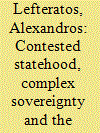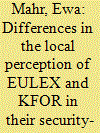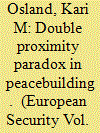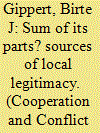|
|
|
Sort Order |
|
|
|
Items / Page
|
|
|
|
|
|
|
| Srl | Item |
| 1 |
ID:
190854


|
|
|
|
|
| Summary/Abstract |
The emergence, longevity and resilience of contested states have redefined the relationship between sovereignty and territoriality. While fully-fledged states uphold the monopoly of authority, contested states seek to rewrite the sovereignty playbook and gain a seat among sovereign equals. This atypical antagonism, propped up by post-Westphalian statehood aspirations, has changed the way sovereignty is perceived and understood nowadays. Approaching sovereignty as multi-faceted, this article discusses contested statehood in the context of the EU's engagement overseas. Drawing on the literature of Europeanisation and complex sovereignty, it accounts for the influence of contested statehood on the EU's role and policies in contested states. Specifically, by delving into Kosovo's complex sovereignty (internal/external), the analysis measures the fluctuating impact of contestedness on the EU's employed policy frameworks and deployed crisis management tools unfolding a paradox that has defined the EU's foreign policy in Kosovo for years.
|
|
|
|
|
|
|
|
|
|
|
|
|
|
|
|
| 2 |
ID:
178613


|
|
|
|
|
| Summary/Abstract |
This article compares the local perceptions of the EU Rule of Law Mission in Kosovo (EULEX) with those of NATO’s mission Kosovo Force (KFOR) and investigates the reasons for observed differences. It focuses on an oft-overlooked aspect of EULEX: its broadly defined security-related tasks. Until recently, EULEX could be seen as a prominent security actor, thanks to its robust police component and its function as a second respondent. EULEX coexists in Kosovo with KFOR; while the former is civilian and the latter military, both play complementary roles in the security realm and some of their tasks are similar. However, the local perceptions of EULEX and KFOR regarding their execution of security-related tasks have differed, with only KFOR enjoying local acceptance. This article argues that such differences are caused by the missions’ differently perceived powers over local actors, as manifested through their ability to exert compliance and cooperation from local actors through coercion, the ability to offer rewards and legitimacy. By going beyond the well-researched initial gratitude of Kosovo Albanians to NATO/US for intervening in 1999, this article offers a more fine-grained analysis of Kosovo Albanian and Kosovo Serbian perceptions of EULEX and KFOR.
|
|
|
|
|
|
|
|
|
|
|
|
|
|
|
|
| 3 |
ID:
168967


|
|
|
|
|
| Summary/Abstract |
This contribution increases the understanding of the EU's role in post-conflict settings by exploring perceptions of EULEX by local rule of law experts. Drawing on critical peacebuilding and the decline of normative power Europe literatures, we develop an analytical framework, underlining the importance of the intention–implementation gap and the implementation–perception gap in understanding how EU missions are perceived. By comparing local expert narratives to those of EULEX judges, prosecutors, and legal officers, we contend that the core problem for the negative perception of the mission results from what we call the double proximity paradox in peacebuilding. The first paradox is one of implementation and transpires when an actor commits substantial resources to address structural problems in a post-conflict territory due to its centrality for its own interests, but fails to uphold its commitment as its immediate interests can only be achieved through agents who contribute to these problems. The second paradox relates to perception and transpires as high commitments raise expectations of structural impact. The visibility of the actor's investment makes any implementation failures more tangible. The actor is therefore, paradoxically, the most open to criticism in a territory where it is doing the most.
|
|
|
|
|
|
|
|
|
|
|
|
|
|
|
|
| 4 |
ID:
149497


|
|
|
|
|
| Summary/Abstract |
The article analyses the sources of local actors’ legitimacy perceptions towards international peacebuilding operations. Local legitimacy perceptions are increasingly recognised as shaping local behaviour towards international peacebuilding, which influences the effective functioning of the operation. Legitimacy debates in peacebuilding are either absent or imported from the literature on domestic legitimacy, without respect to the specific temporal and spatial situation of international operations. The article first explores which legitimacy sources influence local legitimacy perceptions of international peacebuilding operations. It finds that two sources are relevant: output and procedure. Second, it investigates how exactly legitimacy arises from them. In doing so, it demonstrates that output and procedure are umbrella terms comprising several sub-elements which influence legitimacy in different, sometimes contradictory, ways. Finally, the article empirically explores which of the sources are important to local actors’ legitimacy perceptions using field data from the EU peacebuilding operations EULEX in Kosovo and EUPM Bosnia-Herzegovina.
|
|
|
|
|
|
|
|
|
|
|
|
|
|
|
|
|
|
|
|
|